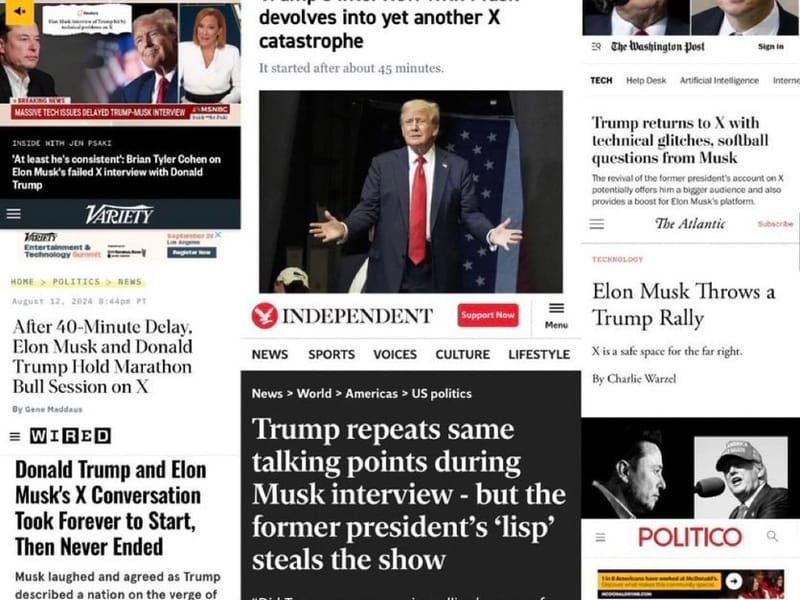The Far-Left Media's Role in Inciting Violence Against Trump: A Dangerous Rhetoric Unleashed
In the tumultuous landscape of American politics, former President Donald Trump has become a lightning rod for criticism, often labeled with terms like "fascist" or compared directly to historical figures like Adolf Hitler by elements of the media and politicians on the left. This rhetoric, while presented as
In the tumultuous landscape of American politics, former President Donald Trump has become a lightning rod for criticism, often labeled with terms like "fascist" or compared directly to historical figures like Adolf Hitler by elements of the media and politicians on the left. This rhetoric, while presented as political discourse, has contributed to an environment where physical threats and attempts on Trump's life have seemingly become a normalized risk.
The Rhetoric of Extremism
The far-left media, often through prominent outlets and influential figures, has not shied away from using hyperbolic comparisons. For instance, terms like "Trump is a fascist" or "Trump is Hitler" have been thrown around with alarming frequency.
- CNN and MSNBC have at times hosted or interviewed pundits who've directly or indirectly suggested that Trump's policies or leadership style mirror those of fascist regimes.
- The New York Times and The Washington Post, while maintaining a veneer of objectivity, have published op-eds and articles where such comparisons are drawn, sometimes subtly, other times overtly.
- On social media platforms, where political discourse often escalates, figures like Joy Reid and Don Lemon have been known to engage in or retweet content that likens Trump's behavior or policies to those of authoritarian leaders.
The Impact on Public Perception and Safety
This constant barrage of severe criticism and historical comparison does more than just paint Trump as a political adversary; it frames him as an existential threat to democracy itself. Here's how this narrative plays out:
- Normalization of Violence: By equating Trump with figures like Hitler, the media subtly or overtly suggests that extreme measures might be justified against him, mirroring the resistance against fascists in historical contexts.
- Encouragement of Radical Actions: When political figures on the left, like Alexandria Ocasio-Cortez or Bernie Sanders, use or endorse such rhetoric (though Sanders is less direct), it amplifies the message, potentially inspiring individuals to take drastic actions, believing they are defending democracy.
- Attempts on Trump's Life: While direct causation is hard to prove, the atmosphere of intense vilification might contribute to the mindset of individuals like the man who allegedly tried to breach a security barrier at a Trump rally or the incident where a man was arrested near Trump's residence with weapons. These incidents, while not always directly tied to media rhetoric, exist in a context where Trump's dehumanization is rampant.
A Call for Responsibility
The media's role in shaping public discourse cannot be understated. While freedom of speech allows for criticism, the language of fascism, dictatorship, and historical genocide does more than criticize; it incites. Here are some considerations for a more responsible discourse:
- Accuracy Over Hyperbole: Comparing anyone in modern politics to Hitler or fascists, without a rigorous historical and contextual analysis, serves more to inflame than to inform.
- The Power of Words: Words have consequences. Rhetoric that dehumanizes or demonizes can lead to physical threats, as history has repeatedly shown.
- Political Rhetoric and Real-World Impact: Politicians and media personalities must recognize that their words can fuel actions. The call for resistance against a "fascist" Trump might sound like political strategy but could translate into physical threats in the minds of the unhinged or deeply radicalized.
The ongoing vilification of Donald Trump by segments of the left-wing media and politicians through extreme comparisons serves not just as political commentary but as a catalyst for a dangerous environment. While Trump's policies and style certainly invite scrutiny, the analogy with fascism or Hitler's regime is not only historically inaccurate but potentially reckless. As the nation navigates these politically charged waters, the media's responsibility to inform without inciting violence becomes ever more critical. The safety of political figures, regardless of how controversial, should not be jeopardized by the very rhetoric meant to uphold democratic values.

